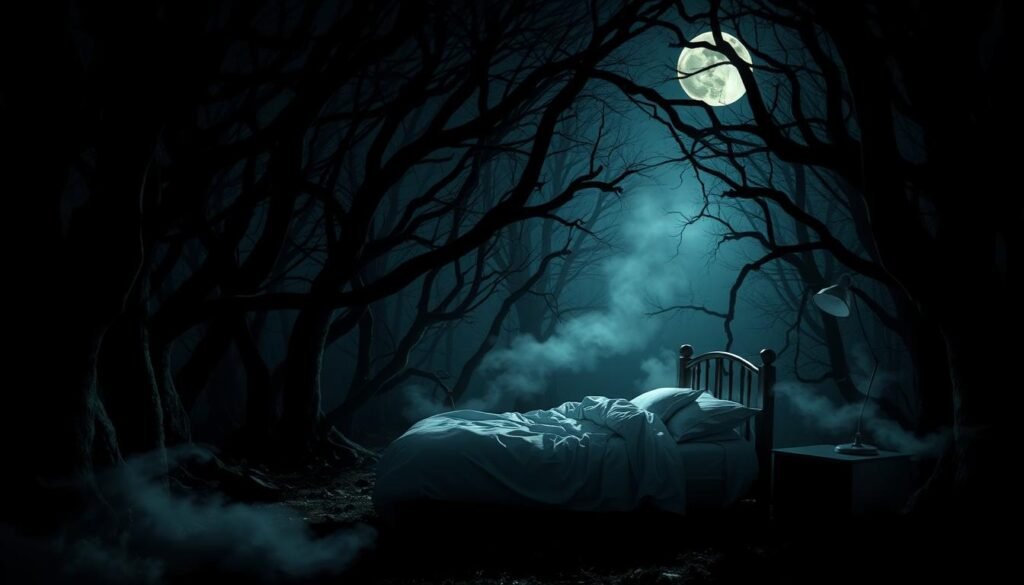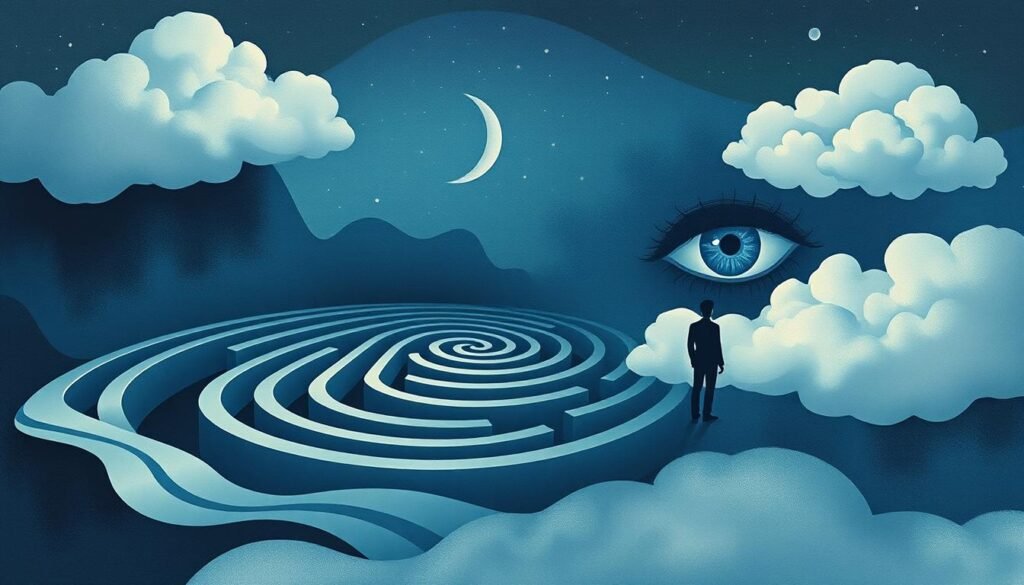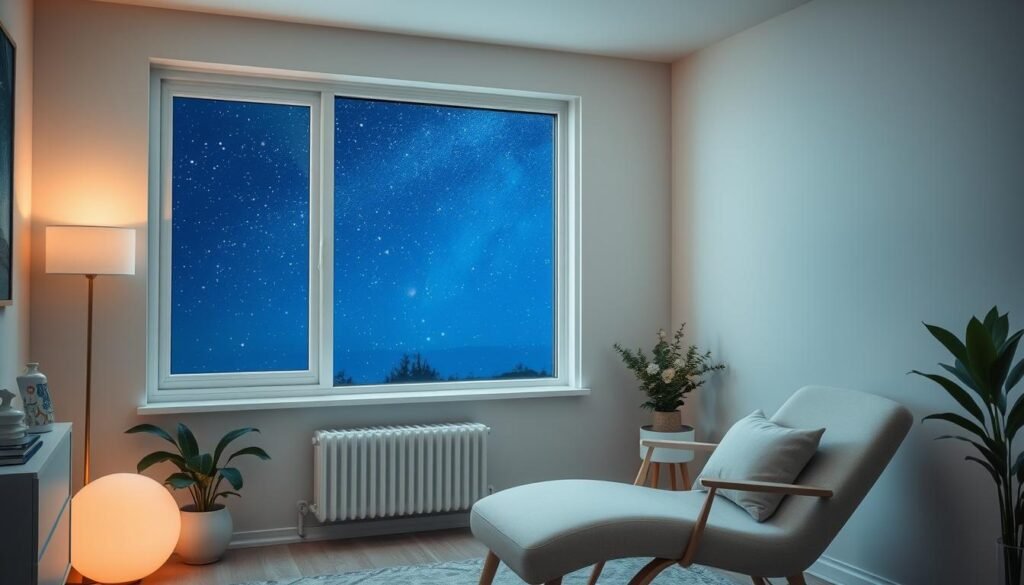It’s shocking, but up to half of all adults will face insomnia at some point. This fact shows how closely anxiety, depression, and sleeplessness are connected. These issues deeply affect a person’s mental and overall health. Around 28.6% of people say they’ve had insomnia, with many also dealing with anxiety (13.9%) and depression (6.4%). This shows a clear need for greater understanding and action. Without help, chronic insomnia can lead to more anxiety and depression.
Mental health is complex, and many with anxiety will also have severe depression. Studies also show that sleep problems may warn us of future mental health issues. So, it’s very important to know how these conditions interact. By doing this, we can better help those suffering.
Key Takeaways
- Up to 50% of adults experience insomnia at some point in their lives.
- Almost two-thirds of patients with anxiety also experience major depression.
- Individuals with insomnia have a tenfold higher risk of developing depression.
- 75% of those with depression face challenges in falling or staying asleep.
- Cognitive Behavioral Therapy for Insomnia can be beneficial for those with both insomnia and depression.
Understanding Insomnia
Insomnia is a widespread sleep disorder. It impacts people at different times in their lives. Knowing about it helps understand the struggles of those who can’t sleep well.
Definition of Insomnia
Insomnia means having trouble with sleep. This includes not being able to fall asleep, stay asleep, or waking up too early. Because of this, people feel tired and have problems during the day. Insomnia is considered chronic when it happens frequently, for several months.
Prevalence of Insomnia
In the U.S., about 30% of adults will face insomnia at some point. Around 10% of them will have chronic insomnia. This condition deeply affects their health. Age and gender play roles, with older people and women being more susceptible. Importantly, over 80% of those with anxiety and depression also experience insomnia, which shows how related these conditions are.
The Connection Between Anxiety and Sleep Disorders
Anxiety is a big reason why people can’t sleep well. It leads to sleep issues like anxiety-related insomnia. People with anxiety have trouble falling asleep because they worry and fear a lot. This makes it hard to sleep and causes them to wake up often during the night. Not getting enough sleep makes anxiety symptoms worse.
How Anxiety Affects Sleep Patterns
Anxiety and poor sleep are closely linked. If you have an anxiety disorder, you’re much more likely to struggle with serious insomnia. This shows anxiety deeply affects good sleep. Anxiety causes racing thoughts and makes you restless. So, you wake up a lot at night and don’t get enough deep sleep.
Symptoms of Anxiety-Related Insomnia
Anxiety-related insomnia has several insomnia symptoms. Many people find it hard to:
- fall asleep because of overwhelming thoughts.
- stay asleep without waking up a lot.
- get restful sleep.
- They also feel very tired during the day.
A lot of people—more than half—said they didn’t have anxiety or depression. But those with both anxiety and depression feel it more. Studies show anxiety disorders are common in people with insomnia, between 24% and 36%. It’s key to treat both mental health and sleep. This link tells us why that’s so important.
Depression and Its Impact on Sleep Quality
Understanding how depression and sleep quality are linked is key for mental health care. Depression makes sleep difficult, leading to issues like insomnia. It’s important to recognize this for effective treatment plans.
Link Between Depression and Sleep Problems
Depression and sleep issues form a tough cycle to break. About 40% of people with insomnia also have depression. Addressing both problems together is necessary. Insomnia can make you wake up early, making depression worse. Luckily, treatments like cognitive behavioral therapy and medications help improve sleep for those dealing with depression.
Statistics on Depression and Insomnia
Sleep issues greatly affect mental health, as shown by insomnia statistics. For instance, 20% of those with depression suffer from obstructive sleep apnea. Another 15% have hypersomnia. Poor sleep can lead to depression or a relapse. Yet, good sleep habits and therapy like CBT can lessen depression symptoms. To learn more on managing insomnia along with depression, visit this resource.
| Statistic | Percentage |
|---|---|
| People with insomnia who have clinical depression | 40% |
| People with depression and obstructive sleep apnea | 20% |
| People with depression who experience insomnia | 80% |
| Those with insomnia facing higher depression relapse risk | N/A |
Anxiety, Depression, and Their Role in Insomnia
The link between insomnia, anxiety, and depression is complex. It shows how they can mix and affect mental health. Knowing that insomnia might lead to these mental health issues is key. It helps us act early and manage it better.
How Insomnia Can Precede Mental Health Issues
Insomnia can be the first sign of anxiety or depression. Research has found that continuous insomnia may point to a higher risk for these conditions. Up to 90% of those with depression have trouble sleeping.
Dealing with insomnia early can reduce the chance of severe mental health problems later.
The Bidirectional Relationship
Insomnia and mental health affect each other in both directions. A major study showed a strong link between insomnia and a higher chance of depression. Those with insomnia may feel more anxious, and people with anxiety often find it hard to sleep.
This back-and-forth makes it vital to look at both issues together. To dive deeper, check out this research.

Physical and Emotional Factors Worsening Sleep Disorders
Many physical and emotional elements can worsen sleep disorders. Knowing these elements is key for better handling and recovery. Stress is a main issue that harms sleep quality. It traps many in a harsh cycle of worry and sleeplessness. As daily challenges grow, so does the stress, which harms sleep. This makes getting enough rest hard.
Stress as a Precipitating Factor
Stress plays a big role in starting sleep problems. Short-term insomnia often comes from stress or upsetting events, hitting many adults. Meanwhile, long-lasting insomnia, going on for three months or more, can start from ongoing stress. This messes with inner calm and sleep quality. People under long-term stress may get mental health issues related to sleep. Chronic stress also makes conditions like anxiety worse, affecting sleep even more.
Effects of Aging on Sleep Disorders
Getting older leads to changes that make sleep disorders worse. Insomnia gets more common as people age. Changes in sleep patterns and health make good sleep harder. Roughly one in three people over 60 often have troubled sleep. These issues come from various factors like stress, health problems, and changes in lifestyle. Dealing with these sleep issues well is crucial for older adults’ life quality. Acting early to manage these disorders helps emotional health and stops more problems.
Making sleep a priority by managing stress and understanding aging can help a lot. Knowing how emotional factors interact with sleep improves rest and health.
Diagnosis of Comorbid Conditions
Diagnosing conditions like anxiety and depression is key to treating insomnia well. A complete mental health check-up is needed. It must include tests to find these hidden disorders. If we overlook anxiety or depression, it can slow down sleep recovery.
Screening for Anxiety and Depression
Screening tools are very important. They help spot anxiety and depression in people with insomnia. These tools let doctors see symptoms that might be missed. Catching these conditions early leads to better, person-specific treatments. This increases the chance of getting better.
Importance of Comprehensive Evaluation
A full mental health check is more than just screening. It digs deep into a patient’s past, symptoms, and mental state. Knowing how insomnia, anxiety, and depression relate helps doctors come up with specific treatments. A thorough diagnostic approach boosts the healing process for those dealing with these linked conditions.

| Condition | Prevalence | Impact on Insomnia |
|---|---|---|
| Anxiety | 25% of insomnia patients | Amplifies sleep disturbances |
| Depression | 90% show insomnia symptoms | Worsens sleep quality |
| Comorbid Conditions | 63% of insomnia patients | Increased treatment resistance |
Non-Pharmacological Interventions
Trying non-drug methods for insomnia can help a lot. They work well for long-term sleep trouble. There’s a way called Cognitive Behavioral Therapy for Insomnia (CBT-I) that changes your thoughts about sleep. It’s really useful. You go to about four to eight meetings. There, you learn about sleep restriction, stimulus control, cognitive therapy, sleep hygiene, and how to relax better.
Cognitive Behavioral Therapy for Insomnia (CBT-I)
CBT-I is a top choice to tackle regular insomnia. It helps people fall asleep faster and sleep more soundly. Most who try it, about 70 to 80%, sleep better. Plus, nearly a third get major benefits, finding a new sleep rhythm. CBT-I doesn’t depend on meds, which makes it a key option.
Mindfulness and Stress Management Techniques
Add mindfulness and stress management to boost your sleep treatment. Mindfulness leads to calm, lowering stress and improving your sleep. Try gently moving your body some time before bed — like with tai chi or low-impact aerobics. It makes falling asleep easier by reducing stress and anxious feelings. This way, good sleep comes more naturally.
Medication Options for Managing Insomnia
Medications can be key in treating insomnia, especially when anxiety or depression makes it worse. Doctors prescribe different medications based on the patient’s needs.
SSRIs and Their Role in Sleep Improvement
SSRIs mainly treat depression but also help with insomnia. Escitalopram, for instance, helps with both anxiety and insomnia. They make sleep better by tackling underlying mental health problems.
Other Medications That Help or Hinder Sleep
Anti-anxiety medications and other drugs can manage insomnia. Benzodiazepines, like lorazepam and diazepam, are used for short-term relief. However, they’re only recommended for up to four weeks because of addiction risks. Non-benzodiazepines such as zolpidem and eszopiclone are preferred for their lower risk of dependence.
| Medication | Type | Indications |
|---|---|---|
| Escitalopram | SSRI | Anxiety, depression, sleep improvement |
| Lorazepam | Benzodiazepine | Short-term insomnia, anxiety |
| Zolpidem | Non-benzodiazepine hypnotic | Difficulty falling asleep |
| Eszopiclone | Non-benzodiazepine hypnotic | Sleep maintenance |
| Doxepin | Antidepressant | Insomnia, anxiety |
Choosing the right medication for insomnia depends on the specific symptoms and medical history. SSRIs and other drugs can improve sleep. But treatment should be careful, combining medicine with lifestyle changes and therapy.
Self-Care Strategies for Better Sleep
Improving your sleep starts with good self-care. This means making your surroundings perfect for sleep and adopting lifestyle habits that promote rest. Sleep hygiene is key in dealing with anxiety and depression issues. To sleep better, stick to a regular sleep schedule, cut down on screen time before bed, and keep your sleeping area peaceful.
Healthy Sleep Hygiene Practices
Good sleep hygiene includes several important actions. Here are the main strategies:
- Keep a consistent time for going to bed and waking up every day.
- Have a calming routine before bed, like reading or meditation.
- Make sure your sleeping space is comfortable, focusing on temperature, noise, and light control.
- Avoid caffeine and big meals before sleep.
- Limit electronic devices use an hour before going to bed.
Impact of Diet and Exercise on Sleep Quality
Diet and exercise play a big role in how well you sleep. Being active can help you fall asleep faster and more deeply. Eating right is also important. Foods with tryptophan, like turkey and nuts, are good for sleep. But, eating a lot late at night might keep you awake. Combining exercise with a healthy diet is key in treating insomnia naturally. This way, you can sleep better without getting hooked on sleep meds.
Seeking Professional Help
Knowing when you need professional help is key for dealing with insomnia from anxiety and depression. If trying to fix sleep issues on your own doesn’t work, it’s time to see a sleep expert. Facts tell us that about 40% of people with insomnia get help from healthcare pros.
Most of these folks, over 92%, talk to their family doctors first. This shows they prefer to start with someone they know in primary care.
When to Consult a Sleep Specialist
If your sleep troubles don’t go away or get worse, seeing a sleep specialist is smart. Those with serious insomnia are more likely to get professional help. And if you’re really stressed or others notice your sleep issues, you’re even more likely to seek help.
Getting help early can make a big difference. It leads to better sleep and mental health.
Therapeutic Approaches for Managing Anxiety and Depression
Therapy can really help, especially cognitive behavioral therapy (CBT) for ongoing sleep problems. You might need 6 to 8 CBT sessions to get your sleep right. This shows why having a clear plan for treatment is important.
Using CBT together with medicine can tackle both anxiety and depression. It also helps you sleep better. To learn about therapy options, check out these strategies.

Potential Long-Term Effects of Untreated Insomnia
Untreated insomnia can severely affect a person’s life. It leads to harmful effects on mental health and life quality. Getting too little sleep can start chronic illnesses. It badly affects how we function every day and our connections with others.
Risk of Developing Chronic Mental Health Issues
Studies show a link between chronic insomnia and mental health problems like anxiety and depression. This shows how vital it is to handle sleep issues early. This can help avoid the dangers of not treating insomnia for a long time. About 70 million people in the U.S. struggle with insomnia. And around 10% to 15% deal with it on a chronic level. This shows it’s a widespread problem.
Impact on Quality of Life and Daily Functioning
Not treating insomnia impacts more than just mental health. It hurts the quality of life. Simple daily tasks start to feel hard. Focus drops, which may hurt job performance or school grades. It can also cause problems in personal relationships and lead to substance misuse.
Chronic insomnia is linked to serious health issues. These include heart disease, diabetes, and chronic pain. Its broad impact shows how serious it is.
To explore more about untreated insomnia’s effects, check this resource.
| Long-Term Effects | Potential Health Implications |
|---|---|
| Chronic Mental Health Issues | Anxiety, Depression |
| Cardiovascular Disease | Heart Attack, Stroke |
| Metabolic Disorders | Diabetes, Weight Gain |
| Cognitive Decline | Memory Problems, Mistakes at Work |
| Decreased Quality of Life | Social Isolation, Job Performance Issues |
Conclusion
The link between anxiety, depression, and insomnia is complex. It shows why we need a well-rounded approach to treatment. About 6-10% of people worldwide suffer from insomnia. This shows sleep problems are a big sign of mental health issues, not just simple symptoms. Anxiety is common in those with insomnia, seen in 24% to 36% of cases. And a huge 90% of people with depression have sleep issues.
Seeing insomnia as a key sign of anxiety and depression underlines the need for full treatment plans. These should include both non-drug and drug treatments. If insomnia isn’t treated, it can make anxiety and depression worse. This makes daily life harder. For those at risk, it’s crucial to catch these issues early. Then, starting a treatment that tackles both sleep and mental health is key.
So, tackling insomnia as part of mental health care is a step forward. It helps promote better health and happiness. Using a mix of professional help, behavioral therapy, and self-care is important. It helps stop the cycle of anxiety, depression, and insomnia. This leads to real improvements in how people feel every day.